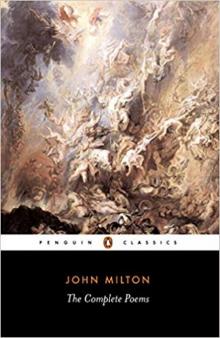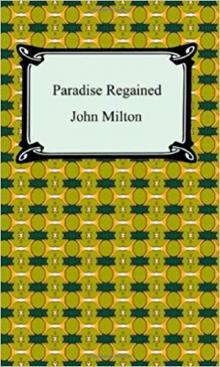- Home
- John Milton
Complete Poetry and Selected Prose of John Milton Page 2
Complete Poetry and Selected Prose of John Milton Read online
Page 2
In Effigiei Ejus Sculptorem (On the Engraver of His Likeness)
Sonnet 11: “I did but prompt the age …”
Sonnet 13: “Harry, whose tunefull …”
Sonnet 14: “When Faith and Love …”
Ad Joannem Roüsium (To John Rouse)
The Fifth Ode of Horace. Book I.
Sonnet 12: “A book was writt of late …”
On the Forcers of Conscience
Psalms 80-88
Sonnet 15: “Fairfax, whose name in armes …”
Verse from Pro Populo Anglicano defensio: “Who released to Salmasius …”
Sonnet 16: “Cromwell, our cheif of men, …”
Sonnet 17: “Vane, young in yeares, …”
Psalms 1–8
Verse from Defensio secunda: “Rejoice, mackerel, …”
Sonnet 18: “Avenge O Lord …”
Sonnet 19: “When I consider …”
Sonnet 20: “Lawrence of vertuous Father …”
Sonnet 21: “Cyriack, whose Grandsire …”
Sonnet 22: “Cyriack, this three years day …”
Sonnet 23: “Mee thought I saw …”
4. THE MAJOR POEMS
Paradise Lost
Paradise Regain’d
Samson Agonistes
TEXTUAL NOTES
BIBLIOGRAPHY
INDEX OF TITLES AND FIRST LINES
PART 1
Poems
Written during School,
College, and University Years
(1624–32)
A Paraphrase on Psalm 1141
When the blest seed of Terah’s faithfull Son,2
After long toil their liberty had won,
And past from Pharian3 fields to Canaan Land,
Led by the strength of the Almighties hand,
5
Jehovah’s wonders were in Israel shown,
His praise and glory was in Israel known.
That4 saw the troubl’d Sea, and shivering fled,
And sought to hide his froth-becurled head
Low in the earth, Jordans clear streams recoil,
10
As a faint host that hath receiv’d the foil.5
The high, huge-bellied Mountains skip like Rams
Amongst their Ews, the little Hills like Lambs.
Why fled the Ocean? And why skipt the Mountains?
Why turned Jordan toward his Crystall Fountains?
15
Shake earth, and at the presence be agast
Of him that ever was, and ay shall last,
That glassy flouds from rugged rocks can crush,
And make soft rills from fiery flint-stones gush.
(1624)
* * *
1 Harris Fletcher, analyzing the grammar school lesson of paraphrasing from one language to another, points out that “Milton’s effort was cast into eighteen lines, or two more than the original verse divisions called for, and was more or less done in this fashion: lines 2, 4, 8, 10 were really added lines; but in lines 13-14 Milton compressed the four lines of verses 5 and 6 …” (Intellectual Development, I, 191). Compare the translation of Milton’s rendition of this same psalm in Greek.
2 Abraham; the original cites only Jacob, the blest seed of Abraham.
3 Egyptian.
4 “the strength of the Almighties hand,” object of “saw.”
5 the sword; therefore, “hath been driven back.”
Psalm 1361
Let us with a gladsom mind
Praise the Lord, for he is kind.
For his mercies ay endure,
Ever faithfull, ever sure.
5
Let us blaze his Name abroad,
For of gods he is the God.
For, .
O let us his praises tell,
10
That doth the wrathfull tyrants quell.
For, .
That with his miracles doth make
Amazed Heav’n and Earth to shake.
15
For, .
That by his wisdom did create
The painted Heav’ns so full of state.
20
For, .
That did the solid Earth ordain
To rise above the watry plain.
For, .
25
That by his all-commanding might
Did fill the new-made world with light.
For, c.
And caus’d the Golden-tressed Sun
30
All the day long his cours to run.
For, .
The horned Moon to shine by night
Amongst her spangled sisters bright.
35
For, .
He with his thunder-clasping hand
Smote the first-born of Egypt Land.
40
For, .
And in despight of Pharao fell,
He brought from thence his Israel.
For, .
45
The ruddy waves he cleft in twain,
Of the Erythræan main.2
For, .
The floods stood still like Walls of Glass,
50
While the Hebrew Bands did pass.
For, .
But full soon they did devour
The Tawny3 King with all his power.
55
For, .
His chosen people he did bless
In the wastfull Wildernes.
60
For, .
In bloody battail he brought down
Kings of prowess and renown.
For, .
65
He foild bold Seon and his host,
That rul’d the Amorrean coast.
For, .
And large-limb’d Og he did subdue,
70
With all his over-hardy crew.
For, .
And to his servant Israel
He gave their Land therin to dwell.
75
For, .
He hath with a piteous eye
Beheld us in our misery.
80
For, .
And freed us from the slavery
Of the invading enemy.
For, .
85
All living creatures he doth feed,
And with full hand supplies their need.
For, .
Let us therfore warble forth
90
His mighty Majesty and worth.
For, .
That his mansion hath on high
Above the reach of mortall eye.
95
For his mercies ay endure,
Ever faithfull, ever sure.
(1624)
* * *
1 Though this paraphrase elaborates upon the Hebrew, its result, unlike that in Ps. 114, is relative simplicity of language and image. Phrases have been traced to George Buchanan (in his Latin paraphrases of the psalms) and to Joshua Sylvester (in his translation of DuBartas’ Divine Weeks and Works). Milton omitted verses 12, 18, and 22 of the original.
2 the Red Sea.
3 dark-complexioned.
Apologus de Rustico et Hero1
Rusticus ex Malo sapidissima poma quotannis
Legit, et urbano lecta dedit Domino:
Hic incredibili fructûs dulcedine Captus
Malum ipsam in proprias transtulit areolas.
5
Hactenus illa ferax, sed longo debilis ævo,
Mota solo assueto, protinùs aret iners.
Quod tandem ut patuit Domino, spe lusus inani,
Damnavit celeres in sua damna manus.
Atque ait, Heu quantò satius fuit illa Coloni
10
(Parva licet) grato dona tulisse animo!
Possem Ego avaritiam frœnare, gulamque voracem:
Nunc periere mihi et fœtus et ipsa parens.
The Fable of the Peasant and the Overlord1
Every year a peasant gathered from an appletree
the most savory fruit / and gave the choice apples to his overlord who lived in the city. / He, pleased with the unbelievable sweetness of the fruit, / transferred the apple tree itself to his own gardens. / The tree, fruitful up to this time but weak from old age, [5] / when moved from its accustomed soil, instantly withered to inactivity. / When at last it was evident to the overlord that he had been deceived / by a vain hope, he cursed the hands so swift in bringing loss. / And he cried, “Alas, how much more satisfactory it was to receive / with a grateful heart these gifts, although small, from my tenant. [10] / Would I could curb my greed and my voracious gullet: / now both the fruit and its parent are lost to me.”
(1624–25)
* * *
1 A version of a popular fable by Aesop, Milton’s twelve elegiac lines were derived from ten by Mantuan (Sylvarum, Bk. 4).
Carmina Elegiaca1
Surge, age, surge, leves, iam convenit, excute somnos,
Lux oritur; tepidi fulcra relinque tori.
Iam canit excubitor gallus, prænuncius ales
Solis, et invigilans ad sua quemque vocat;
5
Flammiger Eois Titan2 caput exerit undis,
Et spargit nitidum læta per arva iubar.
Daulias3 argutum modulatur ab ilice carmen
Edit et excultos mitis alauda modos;
Iam rosa fragrantes spirat silvestris odores;
10
Iam redolent violæ luxuriatque seges.
Ecce novo campos Zephyritis4 gramine vestit
Fertilis, et vitreo rore madescit humus.
Segnes invenias molli vix talia lecto,
Cum premat imbellis lumina fessa sopor;
15
Illic languentes abrumpunt somnia somnos,
Et turbant animum tristia multa tuum.
Illic tabifici generantur semina morbi.
Qui pote torpentem posse valere virum?
Surge, age, surge, leves, iam convenit, excute somnos,
20
Lux oritur; tepidi fulcra relinque tori.
Elegiac Verses1
Arise, up, arise. Now that it is time, shake off slumbers; / light is appearing; leave the props of your languid bed. / Now sings the sentinel cock, the harbinger bird / of the sun, and, watchful, calls everyone to his own affairs. / The flaming Titan2 thrusts his head from the Eastern waves [5] / and scatters his glittering splendor through the joyful fields. / The Daulian3 modulates her melodious song from the oak / and the gentle lark pours forth her perfect notes. / Now the wild rose breathes forth its fragrant perfumes; / now the violets diffuse their scent and the grain grows rapidly. [10] / Behold, the fruitful consort of Zephyr4 clothes the fields with new growth, / and the soil becomes moist with glassy dew. / Lazy one, you are not likely to find such things in your soft bed, / when tranquil sleep weighs down your wearied eyes. / There dreams interrupt dull slumbers [15] / and many griefs disturb your mind. / There the seeds of a wasting malady are generated. / What strength can a listless man be capable of? / Arise, up, arise. Now that it is time, shake off slumbers; / light is appearing; leave the props of your languid bed. [20]
(1624-25)
* * *
1 These and the following verses were written on a loose sheet found in Milton’s Commonplace Book with only this title given for the first. Grammar school exercises, they versify a prose theme on early rising found on the reverse of the sheet: “Mane citus lectum fuge” (“Quick, hasten from your bed in the morning”).
2 Hyperion, here identified with the Sun.
3 the swallow.
4 Chloris, wife of the West Wind.
“Ignavus satrapam dedecet …”1
Ignavus satrapam dedecet inclytum
Somnus qui populo multifido præest.
Dum Dauni veteris filius armiger2
Stratus purpureo procubuit thoro,
5
Audax Eurialus, Nisus et impiger
Invasere cati nocte sub horrida
Torpentes Rutilos castraque Volscia:
Hinc cædes oritur clamor et absonus.…
“Slothful sleep …”1
Slothful sleep is unbecoming to a famous governor / who presides over people divided into many sections of the land. / While the warlike son of old Daunas2 / lay prone on his purple couch, / bold Euryalus and quick Nisus [5] / cunningly attacked in the frightening night / the sleeping Rutilians and the Volscian camp: / hence slaughter arose and discordant shout.…
(Incomplete; 1624–25)
* * *
1 The meter is the lesser Aesclepiad (an irregular verse form used by Horace) with a spondee for the first foot.
2 Turnus, king of the Rutili and leader of the Volscians and other Italian tribes who resisted Aeneas’ invasion. When in a drunken sleep, his army was attacked by Euryalus and Nisus (Aen., IX, 314-66).
Elegia prima
AD CAROLUM DIODATUM1
Tandem, chare, tuæ mihi pervenere tabellæ,
Pertulit et voces nuntia charta tuas,
Pertulit occiduâ Devæ Cestrensis ab orâ
Vergivium prono quà petit amne salum.
5
Multùm crede juvat terras aluisse remotas
Pectus amans nostri, tamque fidele caput,
Quòdque mihi lepidum tellus longinqua sodalem
Debet, at unde brevi reddere jussa velit.
Me tenet urbs refluâ quam Thamesis alluit undâ,
10
Meque nec invitum patria dulcis habet.
Jam nec arundiferum mihi cura revisere Camum,
Nec dudum vetiti me laris angit amor.2
Nuda nec arva placent, umbrasque negantia molles,
Quàm male Phœbicolis convenit ille locus!
15
Nec duri libet usque minas perferre magistri
Cæteraque ingenio non subeunda meo.
Si sit hoc exilium patrios adiisse penates,
Et vacuum curis otia grata sequi,
Non ego vel profugi nomen, sortemve recuso,
20
Lætus et exilii conditione fruor.
O utinam vates nunquam graviora tulisset
Ille3 Tomitano flebilis exul agro;
Non tunc Jonio quicquam cessisset Homero
Neve foret victo laus tibi prima, Maro.4
25
Tempora nam licet hîc placidis dare libera Musis,
Et totum rapiunt me mea vita libri.
Excipit hinc fessum sinuosi pompa theatri,
Et vocat ad plausus garrula scena suos.5
Seu catus auditur senior, seu prodigus hæres,
30
Seu procus, aut positâ casside miles adest,
Sive decennali fœcundus lite patronus
Detonat inculto barbara verba foro,
Sæpe vafer gnato succurrit servus amanti,
Et nasum rigidi fallit ubique Patris;
35
Sæpe novos illic virgo mirata calores
Quid sit amor nescit, dum quoque nescit, amat.
Sive cruentatum furiosa Tragœdia sceptrum
Quassat, et effusis crinibus ora rotat,
Et dolet, et specto, juvat et spectasse dolendo,
40
Interdum et lacrymis dulcis amaror inest:
Seu puer infelix indelibata reliquit
Gaudia, et abrupto flendus amore cadit,
Seu ferus è tenebris iterat Styga criminis ultor
Conscia funereo pectora torre movens,
45
Seu mæret Pelopeia domus, seu nobilis Ili,
Aut luit incestos aula Creontis avos.
Sed neque sub tecto semper nec in urbe latemus,
Irrita nec nobis tempora veris eunt.
Nos quoque lucus habet vicinâ consitus ulmo
50
Atque suburbani nobilis umbra loci.
Sæpius hic blandas spirantia sydera flammas
Virgineos videas præteriisse choros.
Ah quoties dignæ stupui miracula formæ
Quæ posset senium vel reparare Iovis;
> 55
Ah quoties vidi superantia lumina gemmas,
Atque faces quotquot volvit uterque polus;
Collaque bis vivi Pelopis6 quæ brachia vincant,
Quæque fluit puro nectare tincta via,
Et decus eximium frontis, tremulosque capillos,
60
Aurea quæ fallax retia tendit Amor;
Pellacesque genas, ad quas hyacinthina sordet
Purpura, et ipse tui floris, Adoni, rubor.7
Cedite laudatæ toties Heroides8 olim,
Et quæcunque vagum cepit arnica Jovem.
65
Cedite Achaemeniæ9 turritâ fronte puellæ,
Et quot Susa colunt, Memnoniamque Ninon.10
Vos etiam Danaæ fasces submittite Nymphæ,
Et vos Iliacæ, Romuleæque nurus.
Nec Pompeianas Tarpëia Musa columnas11
70
Jactet, et Ausoniis plena theatra stolis.
Gloria Virginibus debetur prima Britannis,
Extera, sat tibi sit, fœmina, posse sequi.
Tuque urbs Dardaniis Londium structa colonis12
Turrigerum latè conspicienda caput,
75
Tu nimium felix intra tua mœnia claudis
Quicquid formosi pendulus orbis habet.
Non tibi tot cælo scintillant astra sereno
Endymioneæ turba ministra deæ,13
Quot tibi conspicuæ formáque auróque puellæ

 Complete Poetry and Selected Prose of John Milton
Complete Poetry and Selected Prose of John Milton Paradise Lost
Paradise Lost The Complete Poems (Penguin Classics)
The Complete Poems (Penguin Classics) Paradise Regained
Paradise Regained The Complete Poems
The Complete Poems The Complete Poetry of John Milton
The Complete Poetry of John Milton